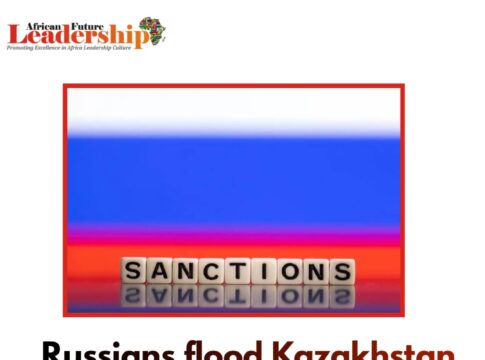ALMATY (Reuters) – Russian companies have flooded their Kazakh partners in recent weeks with new requests to help them circumvent Western sanctions and import badly needed goods, seven sources with direct knowledge of the matter told Reuters.
After Russian forces invaded Ukraine on Feb. 24 last year, the West imposed sweeping sanctions on Russia’s $2.1 trillion economy, prompting Moscow to seek circuitous routes for importing technology and goods.
With the sale of thousands of items banned by the West, traders established an elaborate network of supply chains through third countries to bypass the restrictions. Many goods enter via Turkey and former Soviet republics, economists say.
The seven sources, who all spoke on condition of anonymity due to the sensitivity of the matter, said they had seen a rise in Russian requests to help get everything from bearings and aircraft parts to rare earth metals across Kazakhstan’s 7,591-kilometre (4,717-mile) land border with Russia.
Two of the sources linked the increased Russian interest directly with reported Turkish plans to crack down on the transit of sanctioned goods.
“This means the boom is just beginning,” said one businessman involved in foreign trade who spoke to Reuters on condition of anonymity due to the sensitivity of the issue.
RARE EARTH METALS
Another Kazakh entrepreneur said he had been offered $1 million to help move a truckload of rare earth metals originally from Australia.
READ MORE: Ukraine Receives MIG-29 Fighter Jets From Slovakia
“From phones and bearings to airplane parts and rare earth metals,” the entrepreneur said, giving examples of requests, all of which he said he had turned down.
The Kazakh government did not reply to a request for comment.
Russians have a very long shopping list which includes industrial equipment, railway bearings, advanced electronics, radio equipment, turbines, airplane parts, raw materials, and even bank card materials, the sources said.
Some Russian firms have sought to establish long-term sanction-busting partnerships, the sources said.
Under Russian law, it is an offence to comply with the Western sanctions and sanctions-busting has become a profitable boom industry for some entrepreneurs.
President Vladimir Putin has quipped that Western luxuries are still available in Moscow, though they are more expensive.
U.S. Secretary of State Anthony Blinken urged Central Asian countries during a visit to the region this month to uphold the sanctions and promised to help them deal with collateral damage.
But a Central Asian official, speaking to reporters on the sidelines of Blinken’s visit, said governments could do little to stop traders from re-exporting goods to Russia.
“I walk into a European company’s office and inquire about certain equipment, they say they cannot sell it because it might end up in Russia,” said one Kazakh businessman dealing in industrial equipment.
“As I walk out, I get a call from a Turkish company offering me that same equipment.”
Turkey, a NATO ally, said last month it did not export products that could be used in Russia’s war effort, after U.S. warnings about exports of chemicals, microchips and other items. Ankara also said it would not allow Western sanctions to be violated in or via Turkey and was taking steps to prevent this.
BOOMING TRADE
Russia remains Kazakhstan’s biggest trading partner. Kazakh exports to Russia rose by a quarter to $8.8 billion last year and sales of some items surged. For example, exports of bearings doubled to $111 million, official statistics showed.
Exports of plastic pipes, certain kinds of which Russia has had trouble producing or sourcing, more than tripled last year to $12 million.
At the same time, Kazakhstan sharply increased imports of computers from European countries and Taiwan, although it is unclear how many of them were then re-exported to Russia.
Sometimes no law is even broken, the sources said. Often complex items include sanctioned components but are not explicitly banned themselves. So sharp is the rise in trade that Kazakh customs are overloaded, they added.
Another source said Russian banks were importing equipment and plastics needed to produce bank cards via Kazakhstan.
Still, such business comes with additional costs. Kazakh businessmen reselling goods to Russia are normally eligible for a 12% VAT refund but those who move “suspicious items” do not file for it so as not to expose the whole supply chain, the businessman said.
One source, though, used a Russian proverb to explain why he had decided to get involved in the illicit trade: “For some war is grief and misery but for others it is a way to flourish.”




